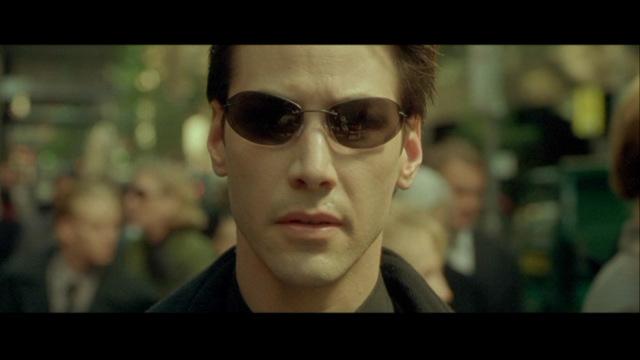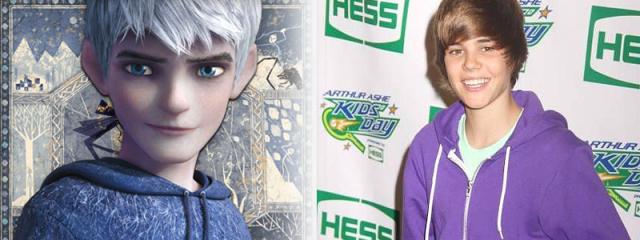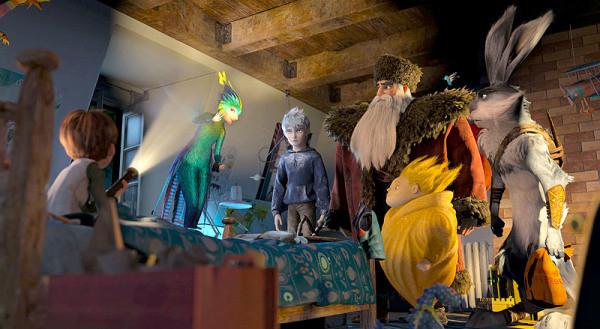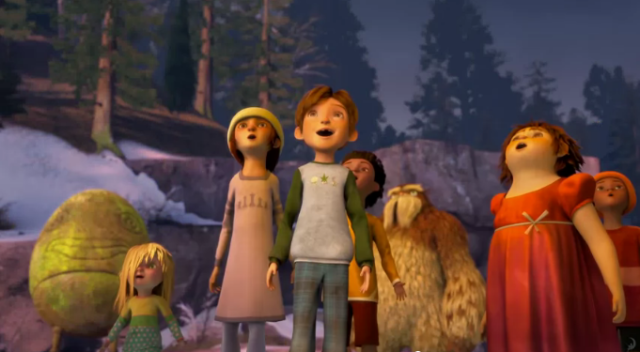So Funk Jr. and I sat down to watch the new animated film Rise of the Guardians, a movie that sees many mythological characters associated with childhood including Santa Claus and the Easter Bunny team up to kick ass. Whilst watching the movie and taking in such bizzarre sights as a population of eggs that have sprouted legs (I’m not sure why this was disturbing, but it was) a thought struck me. The movie seemed to have some strange morals. When you line up all the lessons learnt by the characters it seems that an underlying theme of the movie is a promotion of atheism.

If you can claim that Keanu Reeves is a Christ allegory then I can claim this.
Not that we’re suggesting that the makers of this film set out to produce a propaganda piece. What we found is that movie relies heavily on deus ex machina to move the story along quite frequently, creating some rather thin explanations for the current scene to get to the next. We’ll get to some examples in a moment. First I believe it’s customary to explain ones own religious leanings with this kind of article. I was born into a religious family. Not an extreme or even especially dedicated one, but we did attend church and I was sent to a private school that embodied those beliefs. Late in my childhood, possibly around ten years old, it struck me that I didn’t believe in God so much as I was taught that this was the way things were. There was no big event or tragedy that turned me to a different path, just a kid walking along and having the realisation that there’s a difference between accepting what you’ve been told your whole life and what you actually believing it to be true.
Rise of the Guardians caused me a strange sense of deja-vu in that it seemed to repeat the thought process I had that day. For those who haven’t seen it the movie begins with the ‘Guardians’ being summoned to face the return of Pitch, the personification of darkness, fear and nightmares. The Guardians are North (Santa), Easter Bunny, Sandman and Tooth Fairy. Their leader, the Man on the Moon, decides that one new Guardian is needed and selects Jack Frost, a mischievous sprite who seems to be modelling his look after Justin Bieber.

Have YOU ever seen them together?
The crux of the story revolves around Pitch increasing his stock by stopping the children of the world from believing in the Guardians, rendering their power useless and preventing them from being seen. This is where the atheism angle begins taking shape. The idea of gods being rendered powerless by the numbers of their believers diminishing has been covered in fantasy literature before, such as Terry Pratchett’s Discworld series and George R.R. Martin’s The Song of Ice and Fire. This time around it’s being played to a younger market by swapping out traditional gods with modern figures of myth familiar to children in a western demographic. This would make a pretty thin allegory but the role played by these figures is explained further through the film. Each of the Guardians gives the children a sense of wonder, or hope. Something that makes the world a better place for the children so long as they believe in them. Again, this is setting up the characters to function as allegories for the western perception of a ‘god’ figure. Strangely enough the movie skims over the origins of holidays like Christmas and Easter and make them purely about the more marketable figures associated with them.
This is all pretty incidental, but the scene that blurs the line between common theme and atheist moral comes when the last child in the world who believes in the Guardians appeals to them to come and save the day. This is the sequence most likely to raise some eyebrows. The child, Jamie, provides a monolog where he claims that the Guardians need to prove that they exist in order for people to believe in them. Maybe it’s just because Jamie is a child, but the entire notion of believing in something is that you don’t require proof of it’s existence. Let Douglas Adams explain it.
Once you have knowledge of something existing then you can’t have faith in it. Something of a catch 22. And this character, very much the audience surrogate character, makes it clear that the magical beings that keep the children happy must prove their existence for people to believe in them. Very much the atheist argument, that only something that be undeniably proven can be trusted and worth investing in. During the exact same monolog Jamie (while addressing an icon of the Easter Bunny) that they ‘owed’ him because he has believed in them his entire life. As this comes at the beginning of the monolog it could be construed as the moment when the character/viewer becomes cynical of religion and starts seeking proof or a reason to keep their faith.

“Ok, I believe in…now please get out of my bedroom.”
The final thing that fits into this theory is the children’s interaction with Pitch towards the end of the movie. Pitch naturally fits into the role of Lucifer in this arrangement and as even the most initiated know he plays the villain in this allegory. In modern religious practice the devil is held up as temptation and ultimately punishment for people who turn away from the faith. During the climatic scenes of the movie the children declare that they no longer fear Pitch, rendering his power over them useless.

“Fuck yoooooooooou, Satan!”
When the action in this movie needs to progress it’s done in a pretty hokey way, which is why we end up with scenes like Jamie muttering about belief and proof and the like. Pretty harmless on the surface but you want to turn your kid atheist this is the movie to show them. Outside of this curiosity the movie is pretty ordinary. Watch Wreck-It Ralph instead.

